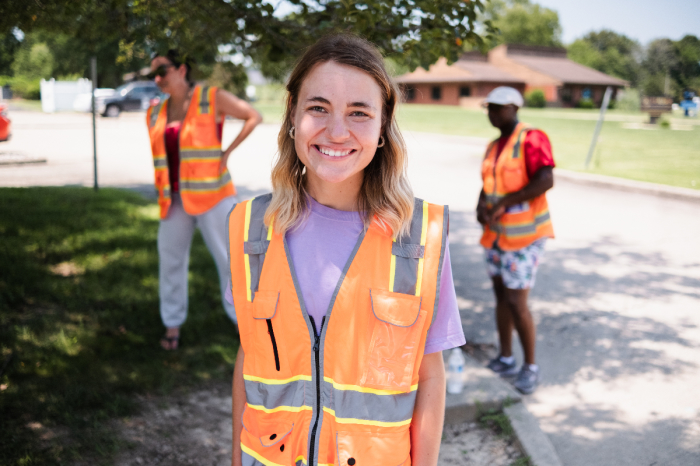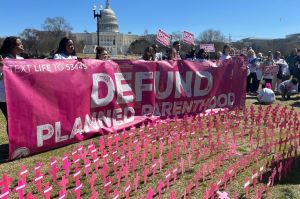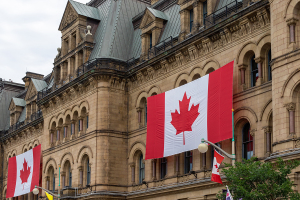Pro-life sidewalk counselors ask Supreme Court to revisit decision upholding abortion 'bubble zones'

A coalition of pro-life sidewalk counselors is asking the United States Supreme Court to revisit a previous decision upholding “bubble zones” outside abortion clinics in light of the court’s recent reversal of the Roe v. Wade decision that legalized abortion nationwide.
In a brief submitted to the Supreme Court Tuesday, attorneys for the Thomas More Society sought relief on behalf of Coalition Life, a group of pro-life sidewalk counselors operating in the Midwest.
Coalition Life is involved in litigation over a law in Carbondale, Illinois, that implements a so-called bubble zone around the abortion clinic in the city that limits the ability of pro-life sidewalk counselors to inform women experiencing unwanted pregnancies of options available to them within 100 feet of the facility.
The bubble zone ordinance in Carbondale was implemented the year after the Supreme Court’s 2022 Dobbs v. Jackson Women’s Health Organizationdecision, which determined that the U.S. Constitution does not contain a right to abortion and overturned Roe. The Dobbs decision has left the legality of abortion up to individual states to decide, and federal lawmakers have engaged in debate about what role, if any, the federal government has in regulating abortion.
As noted in the brief, lower courts have upheld the bubble zone ordinance, citing the Supreme Court’s 2000 decision in Hill v. Colorado. The brief is a petition for a writ of certiorari on behalf of Coalition Life, urging the Supreme Court to hear their appeal of the lower court decision and revisit its ruling in Hill.
The 6-3 Hilldecision upheld a Colorado state law determining that it was “unlawful” for “any person to ‘knowingly approach’ within [8] feet of another person, without that person’s consent, ‘for the purpose of passing a leaflet or handbill to, displaying a sign to, or engaging in oral protest, education, or counseling with such other person’” within 100 feet of an abortion clinic.
Democrat-appointed Justices Stephen Breyer and Ruth Bader Ginsburg joined Republican-appointed Justices Sandra Day O’Connor, William Rehnquist, David Souter and John Paul Stevens in voting to uphold the law, while Republican-appointed Justices Anthony Kennedy, Antonin Scalia and Clarence Thomas dissented. The makeup of the Supreme Court has changed substantially since 2000, with all but Thomas either having retired from the bench or being deceased, as has First Amendment jurisprudence.
The Hill majority acknowledged that activities pro-life activists seek to engage in outside of abortion clinics such as “leafletting, sign displays, and oral communications are protected by the First Amendment,” that “the public sidewalks, streets, and ways affected by the statute are [five] ‘quintessential’ public forums for free speech” and that “[t]he right to free speech, of course, includes the right to attempt to persuade others to change their views, and may not be curtailed simply because the speaker’s message may be offensive to his audience.”
However, the opinion declared that First Amendment rights must be “balanced” against a “privacy interest in avoiding unwanted communication” and concluded that the law restricting the ability of pro-life activists to counsel women in the vicinity of abortion clinics was “a content-neutral time, place, and manner regulation” because it limited all speech as opposed to simply pro-life speech.
“Hill was egregiously wrong the day it was decided, and virtually all of its reasoning has been explicitly repudiated in subsequent decisions that faithfully applied bedrock First Amendment doctrine, leaving no one with any credible (let alone legally viable) claim to reliance on the departure from settled precedent that it marked,” the brief stated. “But the need to restore the First Amendment rights Hill eviscerated is all the more pressing after Dobbs.”
According to the brief, “The whole point of Dobbs was to return debate about the sensitive questions surrounding abortion to the people. That revitalized public debate cannot be conducted with one side licensed ‘to fight freestyle, while requiring the other to follow Marquis of Queensberry rules.’”
“Now that the Supreme Court has returned the abortion debate to the people and their legislators, it is more important than ever to restore the free speech rights of those who advocate for life in the public square,” said Thomas More Society Executive Vice President and Head of Litigation Peter Breen in a statement published after the law firm submitted its request for intervention by the Supreme Court.
Expressing hope that the Supreme Court will “restore the First Amendment rights of pro-life sidewalk counselors like those at Coalition Life and finally give Hill a proper burial,” Breen declared: “It’s time to end, once and for all, the political gamesmanship places like Carbondale play with our free speech rights.”
Coalition Life Executive Director and Founder Brian Westbrook condemned the bubble zone law as “nothing more than the continued and relentless persecution of our team on the sidewalk.”
Westbrook insisted, “This fight won’t be over until Hill is overturned and thousands of municipalities across the nation, like Carbondale, understand you cannot trample on our rights.”
As explained by the Thomas More Society, “Carbondale, a southern Illinois college town with a population of just over 21,000, has become a major abortion hub for those seeking the procedure from across the Midwest and South. Historically home to zero abortion facilities, three abortion venues have taken root in the city in the two years following the landmark overturn of Roe v. Wade.”
The increased number of abortion facilities in Carbondale reflects the fact that Illinois has permissive abortion laws in contrast to many of the neighboring states that have implemented strong pro-life protections following the Dobbs decision.
Ryan Foley is a reporter for The Christian Post. He can be reached at: ryan.foley@christianpost.com





























